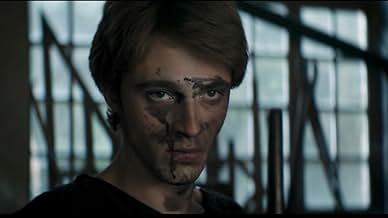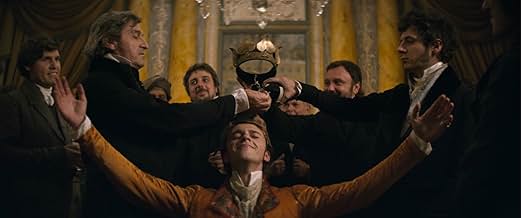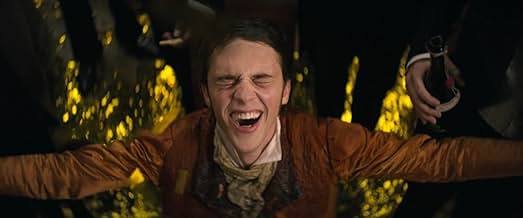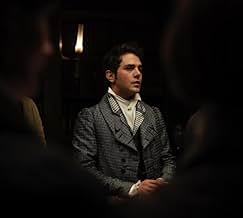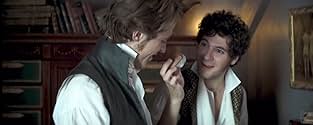Illusions perdues
- 2021
- Tous publics
- 2h 29min
NOTE IMDb
7,4/10
7,2 k
MA NOTE
Une adaptation du roman d'Honoré de Balzac "Illusions perdues".Une adaptation du roman d'Honoré de Balzac "Illusions perdues".Une adaptation du roman d'Honoré de Balzac "Illusions perdues".
- Réalisation
- Scénario
- Casting principal
- Récompenses
- 8 victoires et 19 nominations au total
Avis à la une
10EdgarST
The French cinema "de qualité" was heavily attacked by "nouvelle vague" critics back in the late 1950s and early 1960s. While many of the masters of the preceding decades were no longer giving the best of themselves (with the usual exceptions, such as Renoir or Bresson), the reason for the ridicule was the urgency that the critics (Godard, Truffaut, Rivette et al) had to make their own movies and with their writings they tried to "overthrow" the classics, who were too old to engage in diatribes and humiliations.
The worst of the case is that today we can take works by Clair, Duvivier, Carné or Clouzot and discover magnificent, beautiful, and lustrous films that those angry critics discredited. That cinema "de qualité" accompanies French cinema since cinema is cinema, it is not always of "quality", but there are outstanding works. What is ironic, furthermore and to the point, is that the new French cinema, despite the awards and praise given by festivals and the new critics, alienated the public from the cinemas en masse, Panama included, which had the Teatro Presidente, an exclusive theater for brand new European cinema.
And even more ironic, it is the return to the vein of "quality" cinema. In this category we can add «Illusions perdues», a film based on the novel by Honoré de Balzac that, in the last edition of the César award (supreme prize of the French film industry), it won five distinctions, including best film and screenplay based on another media (adaptation).
Everything is beautiful in the film, including the cast, everything is magnificent, from listening to Gérard Depardieu's hoarse, spirited, and passionate voice as the literary editor who cannot read or write, to Christophe Beaucarne's beautiful images (awarded the César). The weight of the film falls on a cast of young actors, possible big names of the future, who perform with equal panache and skill among veterans.
The anecdote of the film (and the novel) does not propose anything that has not been told before. What makes it very interesting is the social, media, labor, political, economic contexts - in a word, cultural - and their parallel with the present: Lucien de Rubempré is a young man from Angoulême, a country boy with immense poetic talent, to whom society denies him even the option of using his mother's last name, Rubempré, as "nome de plume", which would give him access to an estate, a place at the court and a noble title.
Lucien de Rubempré (Benjamin Voisin, who was 24-year-old actor when playing the role, winner of the César for Best New Actor) not only falls into the corrupt circles of Paris, with their vices and bad habits, he not only exercises vile and caustic journalism , but he literarily does not create anything beyond his book of poetry, written when he was 20 years old. In Paris he comes into direct contact with the city (at a time when the Bourbons were restored to the throne, betraying the ideals of the 1789 Revolution) and falls in love with Coralie, a young and beautiful theater woman, despised as an Andalusian and an actress. The film describes, with the aesthetic rigor that characterizes French cinema and with a current tone, the Parisian world at the beginning of the 19th century, that of the press, critics, publishers, authors, playwrights and the most rogue courtiers that, in their "salons" and circles, scheme to stay in power and marginalize the triumphant bourgeoisie.
The young cast includes Vincent Lacoste (Cesar winner for Best Supporting Actor) as another country boy, hashish smoker and unethical journalist; Canadian filmmaker Xavier Dolan as a talented novelist whom Lucien is able to destroy with one of his cruel and malicious reviews, who ends up being his only friend (and apparently his secret admirer) and Salomé Dewaels as Coralie, the young actress who adores Lucien and is reciprocated.
Lasting two and a half hours, «Illusions perdues» is a model of academic and prestige cinema for exportation, which does not skimp on details, evocations, reconstructions and becomes one more example of how European cinema represents itself better than Hollywood's attempts , tinged with a certain vulgarity, such as «Desirée», with a ridiculous Marlon Brando nasally applying "the Method" to evoke the image of Napoléon Bonaparte; or as «Dangerous Liaisons», with John Malkovich trying to give us, by means of the usual tics (possibly also of the "Method"), an 18th-century Parisian gentleman.
The worst of the case is that today we can take works by Clair, Duvivier, Carné or Clouzot and discover magnificent, beautiful, and lustrous films that those angry critics discredited. That cinema "de qualité" accompanies French cinema since cinema is cinema, it is not always of "quality", but there are outstanding works. What is ironic, furthermore and to the point, is that the new French cinema, despite the awards and praise given by festivals and the new critics, alienated the public from the cinemas en masse, Panama included, which had the Teatro Presidente, an exclusive theater for brand new European cinema.
And even more ironic, it is the return to the vein of "quality" cinema. In this category we can add «Illusions perdues», a film based on the novel by Honoré de Balzac that, in the last edition of the César award (supreme prize of the French film industry), it won five distinctions, including best film and screenplay based on another media (adaptation).
Everything is beautiful in the film, including the cast, everything is magnificent, from listening to Gérard Depardieu's hoarse, spirited, and passionate voice as the literary editor who cannot read or write, to Christophe Beaucarne's beautiful images (awarded the César). The weight of the film falls on a cast of young actors, possible big names of the future, who perform with equal panache and skill among veterans.
The anecdote of the film (and the novel) does not propose anything that has not been told before. What makes it very interesting is the social, media, labor, political, economic contexts - in a word, cultural - and their parallel with the present: Lucien de Rubempré is a young man from Angoulême, a country boy with immense poetic talent, to whom society denies him even the option of using his mother's last name, Rubempré, as "nome de plume", which would give him access to an estate, a place at the court and a noble title.
Lucien de Rubempré (Benjamin Voisin, who was 24-year-old actor when playing the role, winner of the César for Best New Actor) not only falls into the corrupt circles of Paris, with their vices and bad habits, he not only exercises vile and caustic journalism , but he literarily does not create anything beyond his book of poetry, written when he was 20 years old. In Paris he comes into direct contact with the city (at a time when the Bourbons were restored to the throne, betraying the ideals of the 1789 Revolution) and falls in love with Coralie, a young and beautiful theater woman, despised as an Andalusian and an actress. The film describes, with the aesthetic rigor that characterizes French cinema and with a current tone, the Parisian world at the beginning of the 19th century, that of the press, critics, publishers, authors, playwrights and the most rogue courtiers that, in their "salons" and circles, scheme to stay in power and marginalize the triumphant bourgeoisie.
The young cast includes Vincent Lacoste (Cesar winner for Best Supporting Actor) as another country boy, hashish smoker and unethical journalist; Canadian filmmaker Xavier Dolan as a talented novelist whom Lucien is able to destroy with one of his cruel and malicious reviews, who ends up being his only friend (and apparently his secret admirer) and Salomé Dewaels as Coralie, the young actress who adores Lucien and is reciprocated.
Lasting two and a half hours, «Illusions perdues» is a model of academic and prestige cinema for exportation, which does not skimp on details, evocations, reconstructions and becomes one more example of how European cinema represents itself better than Hollywood's attempts , tinged with a certain vulgarity, such as «Desirée», with a ridiculous Marlon Brando nasally applying "the Method" to evoke the image of Napoléon Bonaparte; or as «Dangerous Liaisons», with John Malkovich trying to give us, by means of the usual tics (possibly also of the "Method"), an 18th-century Parisian gentleman.
Lost illusions is for many critics, the best Balzac's novel and the adaptation that Xavier Giannoli (the director) delivers is not only fairly pleasant, dynamic and very well interpreted, it also has a special resonance in our world controled by social networks, search for buzz, influencers, fake news and a few rich media owners.
However, the story seems quite far from our world as it takes place in the first part of the 19th century (around 1820-1830) during the period of "Restauration", when monarchy came back to power in France but also when the liberals were pushing for changing the regime or at least experimenting new liberties such as parliamentarism and freedom of the press.
Lucien de Rubempré is this young man full of dreams who comes from the French country side eager to live from his literary talents, driven by his forbidden love to a rich aristocrat . Sent away to Paris, little by little Lucien will lose his illusions to discover a world full of greed, machiavellianism and dishonesty.
Xavier Giannoli tackles lots of topics in what we understand is a very rich novel. One of the topic is the transformation of literature into merchandise. The depiction of the book publishers is machiavellian. The depiction of a new kind of journalism based on sensacional news is quite shocking. In fact, Xavier Giannoli doesn't make a plea for journalists, on the contrary, he even tries to discredit them and presents them as filthy people, greedy for money. It's sometimes a little bit too much but we understand that the new liberties conceded by the government back in those days have a repercussion on different fields of the society and we also understand it concerns a certain type of journalism and not all journalisms. However the resonence in our 21st century world is quite obvious concerning the search of buzz.
We clearly understand that what the director wants to make us some winks thoughout his film, winks that the attentive spectator cannot miss. There is notably the explanation of how the buzz is created among the press, but also how the media (for the time, mainly newspapers) are controlled and owned by rich entrepreneurs or by the big bosses of advertising agencies and how these influencers of the 19th century try to invade the parliament and get the hold of the main positions among the government. The sentence "there will be a time a bankier will be president of the republic" is clearly a wink to our French president Macron, former banker himself.
All in all, Xavier Giannoli makes a great adaptation, with a lot of characters and a fine depiction and understanding of the changes that were at stake back in the 19th century and that have a special resonance nowadays.
However, the story seems quite far from our world as it takes place in the first part of the 19th century (around 1820-1830) during the period of "Restauration", when monarchy came back to power in France but also when the liberals were pushing for changing the regime or at least experimenting new liberties such as parliamentarism and freedom of the press.
Lucien de Rubempré is this young man full of dreams who comes from the French country side eager to live from his literary talents, driven by his forbidden love to a rich aristocrat . Sent away to Paris, little by little Lucien will lose his illusions to discover a world full of greed, machiavellianism and dishonesty.
Xavier Giannoli tackles lots of topics in what we understand is a very rich novel. One of the topic is the transformation of literature into merchandise. The depiction of the book publishers is machiavellian. The depiction of a new kind of journalism based on sensacional news is quite shocking. In fact, Xavier Giannoli doesn't make a plea for journalists, on the contrary, he even tries to discredit them and presents them as filthy people, greedy for money. It's sometimes a little bit too much but we understand that the new liberties conceded by the government back in those days have a repercussion on different fields of the society and we also understand it concerns a certain type of journalism and not all journalisms. However the resonence in our 21st century world is quite obvious concerning the search of buzz.
We clearly understand that what the director wants to make us some winks thoughout his film, winks that the attentive spectator cannot miss. There is notably the explanation of how the buzz is created among the press, but also how the media (for the time, mainly newspapers) are controlled and owned by rich entrepreneurs or by the big bosses of advertising agencies and how these influencers of the 19th century try to invade the parliament and get the hold of the main positions among the government. The sentence "there will be a time a bankier will be president of the republic" is clearly a wink to our French president Macron, former banker himself.
All in all, Xavier Giannoli makes a great adaptation, with a lot of characters and a fine depiction and understanding of the changes that were at stake back in the 19th century and that have a special resonance nowadays.
I'm not against the use of a narrator in a movie by principle. Narration can be useful to set context, or, even better, have an interesting dialogue with the action. However, I struggle to understand what the writers of this movie were thinking when they decided that every beat of this story needed narration. I felt like I was reading a picture book. It really diminished my enjoyment of the movie. Too bad, because it's a good story, served by excellent actors (I particularly loved Salomé Dewaels) and beautiful costumes and sets. A lot of the narration could have been cut by being more creative with the script and telling us things in different ways, or by simply leaving a few things unsaid and trusting the audience to cope with some ambiguity.
I'm frankly baffled by the fact that it won the "best movie" and "best adapted scenario" César awards (admittedly, I haven't seen its competition).
Also, the little nods to our present time, mostly done by that same narration, were very unsubtle. In a better film, I might have funnier, but there they tended to annoy me.
I'm frankly baffled by the fact that it won the "best movie" and "best adapted scenario" César awards (admittedly, I haven't seen its competition).
Also, the little nods to our present time, mostly done by that same narration, were very unsubtle. In a better film, I might have funnier, but there they tended to annoy me.
It's very rare to be able to watch a 2h long literature movie without getting bored at any point.
Great cast, great adaptation of dialogues that make it a modern adaptation of Balzac while still translating the soul of it.
Great cast, great adaptation of dialogues that make it a modern adaptation of Balzac while still translating the soul of it.
I won't repeat the storyline here as that's already been covered by many others. Lost Illusions is a visually sumptuous film throughout. I did notice that all of the camera work is quite tight, with very few if any longshots. As such it can feel slightly claustrophobic, if by design or chance I'm not sure. I'm not suggesting it a positive or negative, just an observation. I generally liked the male performances, especially Voisin does a nice job. Salome Dewaels does a very fine job as well but I feel the two other female performances were both a bit constrained. Several viewers took issue with the volume of narration - to that I feel there might have been a couple of instances of this, ever so slightly, but for the most part I have no major issues with this element. Lost Illusions is a beautiful and interesting film worth checking out.
Le saviez-vous
- AnecdotesThe character of Nathan d'Anastazio, played by Xavier Dolan, is actually a synthesis of three characters from the novel: Raoul Nathan, a scheming journalist, Daniel d'Arthez, a hard-working writer and Melchior de Canalis, a successful poet.
- GaffesThe Dejazet theater is mentioned, but the movie takes place in the early 1800s, during the Restoration, and this theater was inaugurated on September 27th, 1859.
- Bandes originalesConcerto in A Minor, BWV 1065: I. Allegro
Composed by Johann Sebastian Bach
Performed by Ensemble Bruno Rigutto, Gabriel Tacchino, Jean-Philippe Collard, Jean-Pierre Wallez, Michel Beroff & Paris Orchestral
Meilleurs choix
Connectez-vous pour évaluer et suivre la liste de favoris afin de recevoir des recommandations personnalisées
- How long is Lost Illusions?Alimenté par Alexa
Détails
- Date de sortie
- Pays d’origine
- Site officiel
- Langue
- Aussi connu sous le nom de
- Comédie humaine
- Lieux de tournage
- Sociétés de production
- Voir plus de crédits d'entreprise sur IMDbPro
Box-office
- Budget
- 18 700 000 € (estimé)
- Montant brut aux États-Unis et au Canada
- 126 391 $US
- Week-end de sortie aux États-Unis et au Canada
- 15 182 $US
- 12 juin 2022
- Montant brut mondial
- 8 635 184 $US
- Durée
- 2h 29min(149 min)
- Couleur
- Rapport de forme
- 2.41 : 1
Contribuer à cette page
Suggérer une modification ou ajouter du contenu manquant




